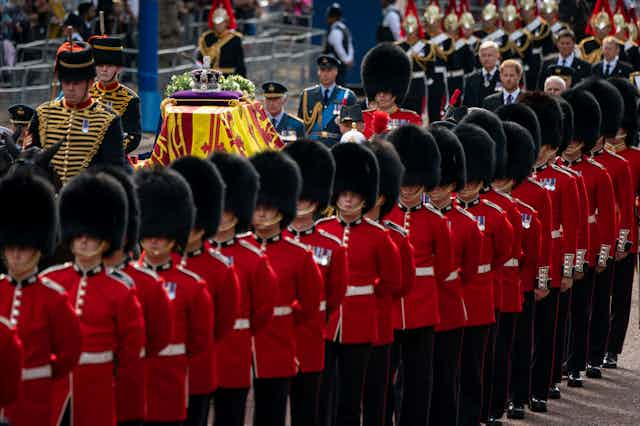In light of Canada’s national holiday for Queen Elizabeth’s funeral and the recent mass murder of 11 people on and near James Smith Cree Nation in Saskatchewan, American philosopher Judith Butler comes to mind:
“One way of posing the question of who ‘we’ are … is by asking whose lives are considered valuable, whose lives are mourned, and whose lives are considered ungrievable.”
Butler wrote these words in 2009 in the book Frames of War: When is Life Grievable?
Butler was referring to how, during the war on terror, certain lives — those of the victims of that war, especially in Afghanistan and Iraq — appeared to be less “grievable,” less worthy of mourning than, say, the victims of the 9/11 terrorist attacks.
Butler made a very careful argument, pointing out that the inability or refusal to mourn publicly is a blot on the conscience of a nation. Butler, best known for the 1990 book Gender Trouble, also highlighted how gays, lesbians and other queer people forced our societies to acknowledge the AIDS epidemic in the 1980s, in part through public grieving.
I turned to Butler when I learned that Monday, Sept. 19, had been deemed a federal holiday and that my province, British Columbia, was in turn calling it a Day of Remembrance.
Schools, universities closed
Locally, this meant that public schools and universities — including Simon Fraser University, where I work — will be closed.
I teach English literature, so I pay attention to language: Prime Minister Justin Trudeau said that “declaring an opportunity for Canadians to mourn on Monday is going to be important.”
“Declaring” is the operative word here. It’s what we call a “performative” word or phrase, like “I promise” that has the role of causing what it describes to take effect.
It’s akin to when the Queen, as head of state, said in London in 2012: “I declare the Olympics open.”
But when the prime minister declares a day of mourning and a federal holiday, in effect our government is saying that the Queen’s life is, to use Butler’s term, more grievable than other lives.
Why mourn the Queen and not the victims on James Smith Cree Nation? I know why. The national holiday makes clear that we believe the Queen’s life and death matters more than Indigenous lives and deaths. Indeed, her life and death matter more than many others.
Read more: Saskatchewan stabbings: Why Myles Sanderson was granted statutory release from prison
In British Columbia, a day off for government workers means that the Queen’s life and death matter more than the lives of the 10,000 people who have died of drug overdoses since a public health emergency was declared in 2016.
I was thinking about this in part because I teach a course on postcolonial studies on Mondays, and it will be cancelled because of a relic of Canada’s imperial past.
The irony is rich. We are being told to mourn an imperial figurehead instead of studying how to dismantle imperialism.
Crackdowns against anti-monarchists
Some might consider it tasteless and disrespectful to the monarchy to compare how we mark the Queen’s death to how we commemorate Indigenous lives. That might be why, in the United Kingdom, people speaking out against the monarchy are being arrested.
A 22-year-old man who heckled the disgraced Prince Andrew in Edinburgh was slammed to the ground, arrested and charged with breach of the peace.
A man shouted out “who elected him?” in Oxford, northwest of London, when the Queen’s heir was proclaimed King Charles III. He said he was arrested and then “de-arrested.”
A lawyer in London was questioned by police merely for displaying a blank sheet of paper. However, as columnist Marina Hyde pointed out in The Guardian, “a breach of etiquette is not a breach of law.”
Do we want to live in a society where it’s considered tasteless to ask questions about privilege? Where it’s considered disrespectful to point out that the same structure of royalty and imperialism that made the Queen unfathomably wealthy was based on centuries of colonial conquest?
Read more: Anti-monarchy protesters arrested – an expert on what the law says
Pomp, circumstance
Our social media feeds are now captive to the blinding force of pomp and ceremony.
We are reminded that the Queen was the first monarch to understand the power of television. The electronic age of monarchy is a kind of soft absolutism, one of image in contrast to the people’s perceptions.
As the head of a family that often resembled soap opera characters, or perhaps mirrored our own dysfunction, the Queen managed to be above politics and down to Earth at the same time. Or at least that’s how we wanted to view her.
We saw these mixed emotions playing out in the public mourning for Princess Diana that manifested itself in mountains of flowers, akin to a giant roadside memorial, as the Queen was subjected to rare criticism about her slow response to the nation’s grief. But maybe we can be more mature this time around.
Asking questions about grievability means confronting uncomfortable truths about our society, Canada and the world at large — especially when we are made to understand, via declarations of public holidays, that the Queen is considered more grievable by authorities than Indigenous people, overdose victims, or you and me.

